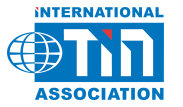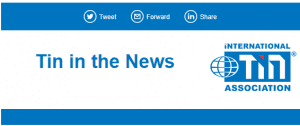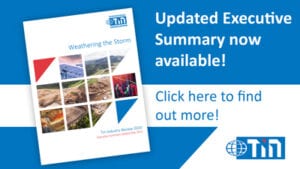
Uncertainty continues around Indonesian tin production and exports amid amplified seasonal licensing delays, while a presidential election and police investigations into corruption allegations add complexity.
Indonesia’s tin industry has recently come under increased government scrutiny, with police investigations being launched into the sector in late-2023. This comes as part of a broader push to ensure compliance with mining, trading, and export regulations and to safeguard the country’s critical mineral resources. The initiative follows similar interventions in the nickel industry last year.
Tin resources have been a growing focus in the country since it became part of a presidential policy to maximise commodity revenues including a downstreaming policy. More recently, the Ministry of Energy and Mineral Resources (ESDM) in Indonesia officially designated tin as a critical mineral for strategic development concerning the energy transition. As such, the government is taking steps to ensure that the industry operates transparently and sustainably.
February’s presidential election had led analysts to expect licensing delays in 2024, however, this has been exacerbated by an ongoing investigation into alleged historical corruption in the Indonesian tin trade. Through January and February, the Office of the Attorney General announced the detaining of several witnesses for questioning surrounding their alleged involvement in these trading practices, including past and present management of some major players.
In January 2024, Indonesian tin exports stood at just 400 kg according to Indonesia’s Ministry of Trade, representing a 99% decrease from January 2023. In previous years, one-year RKAB export licenses have been awarded in mid-January, resulting in a seasonal decline in exports. 2024 marks the first year that Indonesian producers, which accounted for 19% of global refined tin supply in 2023, must apply for a three-year license (which is subject to regulatory review annually). Only state-owned producer PT Timah has publicly confirmed the receipt of the RKAB.
Since a regulatory overhaul in 2015, all refined tin for export must first be sold on either the Jakarta Futures Exchange (JFX) or the Indonesia Commodities & Derivatives Exchange (ICDX), and trading activity has typically resumed in the final week of January. There has been no activity in tin contracts on either exchange so far in 2024.
On Monday 26th February, a spokesperson for EDSM said that the ministry was currently focusing on approvals for tin and nickel mining licenses.
Our view: The global theme of resource nationalisation continues to develop. President-elect Prabowo Subianto has committed to continuing his predecessor’s downstreaming policies. Licensing delays in Indonesia alongside a lack of reported developments in lifting the tin mining suspension in Wa State, bring supply concerns for the first half of 2024.
Traders across Europe and Asia have voiced concerns over the lack of high purity tin ingots on the market and recent weeks have seen an increase and upward widening of tin premiums. The industry watches closely for February’s refined tin export figures, expected to be released in the first week of March.


